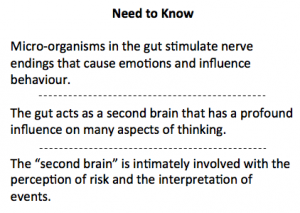Is Your Gut the Most Important Part of Your Brain? Body & Brain Part 3
October 8, 2015 ~ Written by: W.B. “Bud” Kirchner
 “My guest, Dr. Michael Gershon, believes we have a second brain in the gut. I’ll ask him where he thinks the first one is.” – Stephen Colbert on the Colbert Report
“My guest, Dr. Michael Gershon, believes we have a second brain in the gut. I’ll ask him where he thinks the first one is.” – Stephen Colbert on the Colbert Report
Let’s start with a 30,000 feet perspective of another brain now, and in the next post get into details. Incidentally, this should also provide additional context on our previous post titled “An Exercise in Risky Business.”
Who is in charge here?
 In our first post in this series I shared a few tidbits to illustrate that there is more to the brain than “the brain.” What I have been alluding to as the second brain, is in fact the enteric nervous system (ENS). It is part of the autonomic nervous system, which is involved with visceral activities. The central nervous system is in communication with the gut via the autonomic nervous system (sympathetic and parasympathetic branches). It can operate as independent although most often it works with the central nervous system.
In our first post in this series I shared a few tidbits to illustrate that there is more to the brain than “the brain.” What I have been alluding to as the second brain, is in fact the enteric nervous system (ENS). It is part of the autonomic nervous system, which is involved with visceral activities. The central nervous system is in communication with the gut via the autonomic nervous system (sympathetic and parasympathetic branches). It can operate as independent although most often it works with the central nervous system.
The areas of collaboration include several we have touched on in various contexts in previous posts (as they relate to the Business Brain Model context). They are (basic) memory, moods, decision making and behavior – including reactions.
While the ENS is clearly not involved in conscious thoughts such as abstract thinking, it is also clearly not solely focused on the movement of food and waste including chemical processing, physical churning and peristaltic movement. In what seems like some form of feedback system, the nervous system via its ability to effect gut transit time and the production of mucus can help dictate which microbes inhabit the gut with consequences we will discuss.
Sure sounds like another brain to me!
Your Gut Talks to Your Brain, Not Vice-Versa
Actually 10 percent of the fibers in the vagus (your primary visceral nerve) carry information from the brain to the gut. But the other 90 percent of the fibers go from the gut to the brain. Yes, you read that correctly! Body → Brain.
“Gut microbes are part of the unconscious system influencing behavior.”
Micro-organisms in the gut stimulate nerve endings that cause emotions such as described in a previous post. An extensive network of neurons and a steady flow of chemicals and hormones (produced in the gut) provide feedback connecting your brain and your gut. The implications of this are clear!
Justin and Erica Sonnenburg, both Ph.D. researchers at Stanford University, authored the book “The Good Gut: Taking Control of Your Weight, Your Mood and Your Long-term Health.” In it they discuss the HPA (hypothalamic – pituitary – adrenal) axis. This is how the gut talks to the brain about hormones helping digestion.
Most interestingly, they look at the gut as an ecosystem with “competing species” where “the environment within the gut dictates which inhabitants thrive.” In other words – those with the most intestinal fortitude (I bet you saw that one coming) will survive.
All jokes aside, because we now know the vast majority of information travels from the gut to the brain – and not vice versa – there is a growing group of scientific researchers studying how your second brain works with your first brain and directly impacts your life.
Hard Science
In their paper “Collective unconscious: How gut microbes shape human behavior” which appeared in the April 2015 Journal of Psychiatric Research, University College Cork, Ireland researchers Timothy G. Dinan, Roman M. Stilling, Catherine Stanton and John F. Cryan summarize as follows:
- “Gut microbes are part of the unconscious system influencing behavior.”
- “Microbes majorly impact on cognitive function and fundamental behavior patterns.”
- “Disorganisation of the gut microbiota can negatively impact on mental health.”
In their paper titled “Reduced anxiety-like behavior and central neurochemical change in germ-free mice,” authors K. M. Neufeld, N. Kang, J. Bienenstock and J. A. Foster, who are researchers at the Brain-Body Institute in Canada, said, “We conclude that the presence or absence of conventional intestinal microbiota influences the development of behavior and is accompanied by neurochemical changes in the brain.”
A few specifics (these are expanded on) from Jane Foster, Ph.D., a Canadian researcher at McMaster University whose work has appeared in the journal Neurogastroenterology and Motility:
- “Our genetics determines our predispositions, but the gut biome influences how those predispositions function on a day-to-day basis.”
- From birth “the cross talk between the gut biome and the brain is continual.”
- “Modulation of the enteric microbiota may be a useful strategy” for the treatment of stress-related disorders.
Little known facts
By way of expanding your horizons in this area in an easier to read format, I recommend a book by Michael Gershon, M.D., called “The Second Brain: A Groundreaking New Understanding of Nervous Disorders of the Stomach and Intestine.” Incidentally, Gershon is credited with discovering the second brain. In order to save you a bit of time here are some of the relevant facts.
- It is about 25 feet in length (extending from the esophagus to anus).
- The microbiome of the gut is part of the 100 trillion bacteria that live in and on our body.
- The trillions of microbes (microbiome) weigh an estimated two to six pounds – twice the weight of the average human brain (These are so important I will give them their own article.).
- It contains more than 100 million neurons – more than your spinal cord but less than the first brain (100 billion).
- It manufactures over 30 neurotransmitters
We’ve all seen the brain but have we seen the (second) brain.
Second Brain Conclusion
“Warren Buffet told me once…always follow your gut.” LeBron James
What’s a business-person to conclude?
- Let’s start with the irrefutable:
- There is a second brain!
- It has a profound influence on many aspects of the thinking and acting involved with success and performance.
- It is intimately involved in phenomena such as the perception of risk.
- The second brain is dependent on microbes to convey messages and interpret events.
- Our health and performance is also heavily influenced by these same microbiota.
Let’s leave it here since the last two points are already touching on our next post.
About the Author: W.B. “Bud” Kirchner is a serial entrepreneur and philanthropist with more than 50 years of business success. He is not a scientist or an academic but he does have a diversified exposure to neuroscience, psychology and related cognitive sciences. Generally speaking, the ideas he expresses here are business-angled expansions of other people’s ideas, so when possible, he will link to the original reference.
